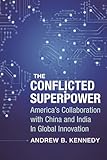The Conflicted Superpower : America's Collaboration with China and India in Global Innovation / Andrew Kennedy.
Material type: TextSeries: A Nancy Bernkopf Tucker and Warren I. Cohen Book on American-East Asian RelationsPublisher: New York, NY : Columbia University Press, [2018]Copyright date: ©2018Description: 1 online resource : 5 b&w illustrationsContent type:
TextSeries: A Nancy Bernkopf Tucker and Warren I. Cohen Book on American-East Asian RelationsPublisher: New York, NY : Columbia University Press, [2018]Copyright date: ©2018Description: 1 online resource : 5 b&w illustrationsContent type: - 9780231185547
- 9780231546201
- 327.73009/05
- E895 .K46 2018
- E895
- online - DeGruyter
- Issued also in print.
| Item type | Current library | Call number | URL | Status | Notes | Barcode | |
|---|---|---|---|---|---|---|---|
 eBook
eBook
|
Biblioteca "Angelicum" Pont. Univ. S.Tommaso d'Aquino Nuvola online | online - DeGruyter (Browse shelf(Opens below)) | Online access | Not for loan (Accesso limitato) | Accesso per gli utenti autorizzati / Access for authorized users | (dgr)9780231546201 |
Browsing Biblioteca "Angelicum" Pont. Univ. S.Tommaso d'Aquino shelves, Shelving location: Nuvola online Close shelf browser (Hides shelf browser)

|

|

|

|

|

|

|
||
| online - DeGruyter Writings from the Golden Age of Russian Poetry / | online - DeGruyter Sisters of the Cross / | online - DeGruyter Open to Reason : Muslim Philosophers in Conversation with the Western Tradition / | online - DeGruyter The Conflicted Superpower : America's Collaboration with China and India in Global Innovation / | online - DeGruyter Transatlantic Speculations : Globalization and the Panics of 1873 / | online - DeGruyter Raising China's Revolutionaries : Modernizing Childhood for Cosmopolitan Nationalists and Liberated Comrades, 1920s-1950s / | online - DeGruyter At Home in the World : Women and Charity in Late Qing and Early Republican China / |
Frontmatter -- Contents -- Preface -- INTRODUCTION -- 1. THE RISE OF GLOBAL INNOVATION -- 2. INNOVATION LEADERSHIP AND CONTESTED OPENNESS -- 3. THE SWINGING DOOR: Skilled Workers -- 4. THE OPEN DOOR: Foreign Students -- 5. THE (MOSTLY) OPEN DOOR: Global R&D -- CONCLUSION -- Notes -- Bibliography -- Index
restricted access online access with authorization star
http://purl.org/coar/access_right/c_16ec
For decades, leadership in technological innovation has sustained U.S. power worldwide. Today, however, processes that undergird innovation increasingly transcend national borders. Cross-border flows of brainpower have reached unprecedented heights, while multinationals invest more and more in high-tech facilities abroad. In this new world, U.S. technological leadership increasingly involves collaboration with other countries. China and India have emerged as particularly prominent partners, most notably as suppliers of intellectual talent to the United States. In The Conflicted Superpower, Andrew Kennedy explores how the world's most powerful country approaches its growing collaboration with these two rising powers.Whereas China and India have embraced global innovation, policy in the United States is conflicted. Kennedy explains why, through in-depth case studies of U.S. policies toward skilled immigration, foreign students, and offshoring. These make clear that U.S. policy is more erratic than strategic, the outcome of domestic battles between competing interests. Pressing for openness is the "high-tech community"-the technology firms and research universities that embody U.S. technological leadership. Yet these pro-globalization forces can face resistance from a range of other interests, including labor and anti-immigration groups, and the nature of this resistance powerfully shapes just how open national policy is. Kennedy concludes by asking whether U.S. policies are accelerating or slowing American decline, and considering the prospects for U.S. policy making in years to come.
Issued also in print.
Mode of access: Internet via World Wide Web.
In English.
Description based on online resource; title from PDF title page (publisher's Web site, viewed 29. Mrz 2022)


